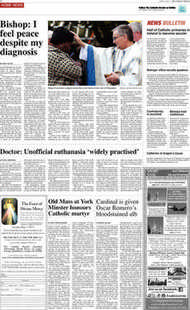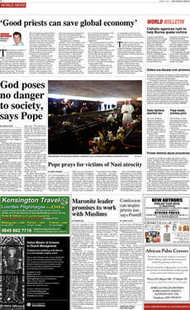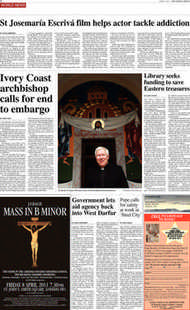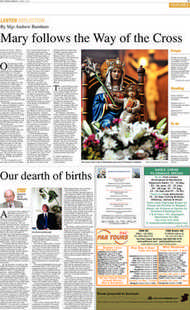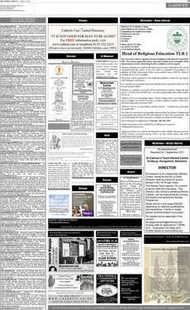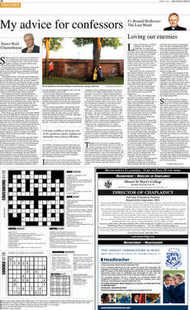Page 20, 1st April 2011
Page 20

Report an error
Noticed an error on this page?If you've noticed an error in this article please click here to report it.
Tags
Share
Related articles
Questions & Answers
'question And Answer
Bring Childlike Honesty To Confession
A 10 Cath Oli C Heraw Fri Da Y, Fl,
Question And Answer
My advice for confessors
Stuart Reid Charterhouse
Some people find it hard to go to Confession once a month and others find it hard not to go to Confession once a day. On the whole, though, Catholics no longer bother much with the Sacrament of Penance.
In his pastoral letter to mark St Patrick’s Day Archbishop Timothy Dolan of New York told the joke about a priest who said he was frightened of dying in the confessional. Why? “Because no one would find me for days.” The archbishop also wrote with great insight about our “confessional” culture: “Our culture has an almost perverse delight in detailing the sins and scandals of those in the public eye. And ordinary people are eager to get in on the action! We produce an entire genre of ‘reality shows’ which put on public display much sinful behaviour that people should be embarrassed about, not celebrated for. Seems as if everybody’s ‘going to confession’ except in the sacrament!” In his address last Friday to priests attending a course organised by the Apostolic Penitentiary – it’s difficult to decide whether that sounds like a maximum security jail or an open prison – Pope Benedict XVI may have been thinking of these things when he declared: “In our time, characterised by noise, by distraction and by solitude, the colloquy of the penitent with the priest can represent one of the few – perhaps the only – occasion for truly being listened to and heard in the depths of one’s being.” When three years ago the editor very kindly offered me custody of Charterhouse, I had just returned to the practice of the Faith after a long absence, and one of my early columns was about the kindness and gentleness of priests in the confessional. That was the first thing that struck me about the Church I’d returned to, and in that respect it was no different from the Church I’d drifted away from. In the ensuing three years I have also discovered that confessors can offer practical help as well as spiritual advice. Not so long ago a priest, hearing me confess to neglect of my dead mother, offered to bury my mother’s ashes for me – and did so last week.
In his address on Friday the Pope said that Confession can be a teaching moment for both priest and penitent. Obviously, it’s a good idea to listen carefully to what the priest has to say to us in the confessional. Even when we think it is nonsense, we should not interrupt, far less try to trip the priest up.
It’s also a good idea to listen to what priests say about preparing for Confession. Our distinguished North American correspondent, the omniscient Fr John Zuhlsdorf, has an excellent 20-point guide to Confession on his website. (I am especially amused that he reminds us always to confess our own sins and not someone else’s.) But do priests ever need advice from laymen about how to hear Confession? Perhaps the very question is unpardonably impudent, but if one were tempted to such impudence, here’s the sort of stuff one might come up with: Never let your irritation or boredom show, Father, and never snigger, unless the penitent has made a joke. More importantly (and seriously): always treat the penitent as though he were an adult. Don’t try to put him at his ease by being hearty and saying things like: “And what do you want to confess to the Lord today?” Listen without interruption to the penitent, unless you need a clarification or amplification. When the penitent has finished, advise and encourage, and, if necessary, rebuke. In some cases you may need to rebuke the penitent for being a smart alec, a theological clever-clogs. Show no mercy.
But the most important piece of advice I can offer is this: do not give one of those, do-it-yourself subjective penance – you know, sit in the Lady Chapel and medi tate on Hope. Scrupulous penitents might spend the next couple of hours in the Lady Chapel, fearing that anything less would not be true penance. How long is long enough? Besides, some of us simply can’t meditate, and, if we try, tend to think unkind thoughts about the priest who has just asked us to meditate, thus committing yet more sins.
In the past three years I have learned quite a bit about myself in the confessional, and quite a lot about priests, too. My most important learning experience in the confessional, however, came in the 1970s, at St James, Spanish Place. The priest said that I was guilty of “pride masquerading as humility”. I was very indignant at the time, since I had poured out my guts the priest; but he was right.
At a practical level, meanwhile, I have discovered that not all priests like you to recite a list of sins. Or perhaps I should say some priests don’t like you to read from a written list of sins.
I confess that I sit and scribble in the penitents’ queue – crossing a word out here, adding an intensifier there, underlining a phrase or adding an NB elsewhere – but once a priest got a bit cross with me. “Well,” he said, “if you are just going to sit there reading from a list...” As it happens, I wasn’t sitting. There was a chair but I was kneeling primly alongside it. Now I added passive aggression to my other sins, and, bowing my head demurely and closing my eyes, apologised ever so ’umbly.
That was not a happy learning experience for either of us.
Still, even the priests who have displeased me with their heartiness or brusque manner are giants among men, giants of kindness and patience, who have given up the comforts of home and family to dedicate themselves to love of God through neighbour.
Talking of sin, is it a sin to weigh yourself during Lent? The Lenten fast is not, after all, a diet; in fasting we seek not sexy hips but spiritual strength. Then again, we are all human, and I confess that I have weighed myself. Mary has also weighed herself, and we are both pleased with our progress. I’ll try to keep away from the scales, however, until Laetare Sunday (when some of you may be reading this). Naturally, I’ll make sure to weigh myself in the morning rather than in the evening when all that rejoicing will have taken its toll.
blog comments powered by Disqus



